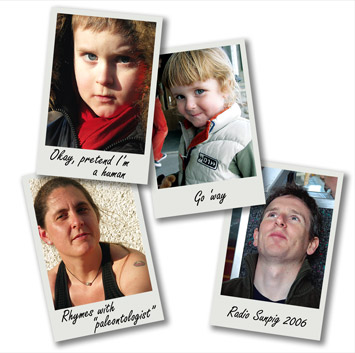 I only saw 58 films in 2006. This is not a particularly good count, especially considering I have a subscription to LoveFilm which provides more back catalogue than any human can reasonably handle. (As a mater of fact, of the 58 films, only 19 were LoveFilm rentals. And I’m paying £9.95 a month for this service. Although I love the idea of having 40,000 films on tap, this isn’t exactly giving me enormous value for money. I think it’s time to re-assess my subscription package.) I also haven’t been keeping up-to-date with my quick reviews, although I have made sure at least to rate everything I’ve seen.
I only saw 58 films in 2006. This is not a particularly good count, especially considering I have a subscription to LoveFilm which provides more back catalogue than any human can reasonably handle. (As a mater of fact, of the 58 films, only 19 were LoveFilm rentals. And I’m paying £9.95 a month for this service. Although I love the idea of having 40,000 films on tap, this isn’t exactly giving me enormous value for money. I think it’s time to re-assess my subscription package.) I also haven’t been keeping up-to-date with my quick reviews, although I have made sure at least to rate everything I’ve seen.
This leaves me feeling remarkably unqualified to comment on the “best” of 2006, because I’ve missed so many films that I know would have been totally awesome. So I’ll just point out a few really good ones:
- The Prestige
Suspenseful story of obsession, revenge, and deception between a pair of magicians in 19th century London. If you’re put off by the apparent historical setting (period pieces are not normally to my taste), don’t be afraid of this one, because you can actually see it as science fiction. The performances are nothing short of magnificent. - Harsh Times
Another amazing performance by Christian Bale. I found his transformation from Home Counties to Homeboy somewhat disconcerting for the first few minutes of the film, but after that he totally owned the screen, giving a tightly contained portrayal of an Iraq War veteran failing to come to terms with life as a civilian. - Holly
I saw this at the Edinburgh Film Festival with Richard of Filmstalker (your first stop for quality movie news), and was blown away. It’s a harrowing tale of ex-pat antiquities dealer Patrick (Ron Livingston) who meets a child prostitute and becomes obsessed with the idea of saving her. You’ll be hard-pressed to actually find this film anywhere, but it’s definitely worth making the effort to catch it if you can. Read Richard’s review. - Zathura
Not an exceptionally original story, just a perfectly paced family adventure film. - Mission: Impossible III
Again, not especially original, just a perfectly executed action blockbuster. Great set pieces, and edge-of-the-seat tension. Loved it. - Syriana
Complex political drama that crawls all over the corruption that surrounds middle-east politics and the oil trade. Difficult to watch, but important to have done so.
Remarkably, I didn’t rate any films lower than 2 stars (“disappointing”) this year. Normally there are at least a couple of outright stinkers. The greatest disappointment was Superman Returns, which I felt was dull and emotionally aimless. I have higher expectations of superhero films, and especially of Bryan Singer.
The worst film I saw all year was probably Tenacious D: The Pick Of Destiny, but I didn’t have terribly high hopes for it in the first place. Which means that rating it as “disappointing” weighs disproportionately strongly.
My favourite movie people of the year are Christian Bale (for Harsh Times and The Prestige) and George Clooney (for Syriana and Good Night, And Good Luck). Christopher Nolan also gets awesomeness points for putting out yet another film that is going to hit my all-time favourites list.
I haven’t really been keeping up with my movie news, but there are a few films that I am excited about for 2007:
- The Fountain (Hugh Jackman was excellent in The Prestige, and I have high hopes for this one.)
- Blood Diamond (Leonardo DiCaprio gets better with every film he stars in.)
- Babel (Likewise Brad Pitt.)
- Spider-man 3 (There is no way this cannot be awesome.)
- My Name Is Bruce (I just hope this gets a UK release. Because it’s BRUCE CAMPBELL, baby!
So, is there anything I’ve missed?


 The biggest online worlds may seem well-developed compared to their predecessors, but they are in still in their infancy with regard to user interaction and freedom of action. Despite being larger than any
The biggest online worlds may seem well-developed compared to their predecessors, but they are in still in their infancy with regard to user interaction and freedom of action. Despite being larger than any 


 Well, it has taken some time to get to this point, but this afternoon the man behind it all,
Well, it has taken some time to get to this point, but this afternoon the man behind it all, 